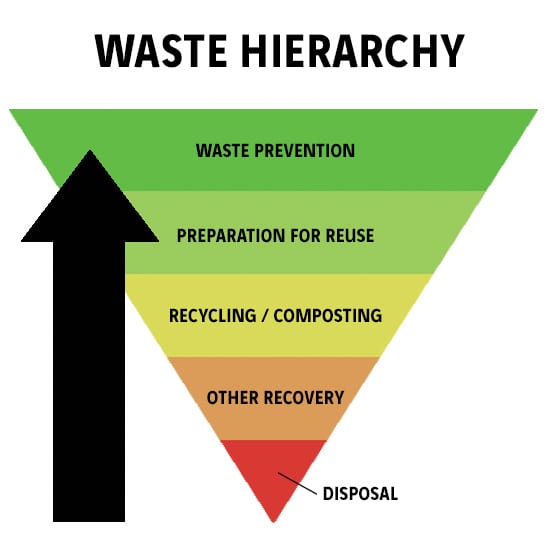Research firm Eunomia today called on the environment secretary, Michael Gove, to focus on the higher stages of the waste hierarchy rather than energy from waste, as he prepares a new resource strategy.

As Defra works on a resource strategy, Michael Gove has been urged by Eunomia to focus on the upper levels. Energy from waste is included in ‘other recovery’
The call came as a study by the consultancy, which specialises in resource policy, claimed to show that the UK is heading “inexorably” towards the point where there will be more energy from waste and other residual waste treatment plants than needed. And, the Bristol-based firm suggests that because of this, the UK recycling rate will be pegged back to a maximum of 63%.
Growth
The residual waste findings come in Eunomia’s 12th Residual Waste Infrastructure Review, published today (7 August). It highlights the significant growth in residual waste treatment capacity that has taken place since the firm started tracking facility development in 2009.
The consultancy’s latest work warns that along with new energy from waste plants coming on stream and with more in the construction pipeline, these “will exceed the available quantity of residual waste in 2020/21. Were all facilities to operate at full capacity, together they would limit the UK’s recycling rate to no more than 63%.”
The report considers two future scenarios, based on the different policy directions available to the UK government (as shown in the chart):
- In Scenario 1, the UK continues to apply current and planned EU recycling targets, which leads to further reductions in residual waste.
- In Scenario 2, the UK meets existing (household) recycling targets for 2020; thereafter, household recycling rates remain through to 2030, while there is a modest increase in Commercial & Industrial (C&I) recycling rates.

Chart shows Eunomia’s forecasts for residual waste decline: black line, scenario one; and blue-dash line, scenario two
In both scenarios, Eunomia finds that the UK reaches excess capacity in 2020/21, assuming that Refuse Derived Fuel (RDF) exports continue at today’s levels.
Excess
The report explains: “Scenario 1 sees the level of excess residual treatment capacity rise to 9.5 million tonnes by 2030/31 as increasing amounts of waste are recycled. More surprisingly, in Scenario 2, despite little progress on recycling, the UK’s current committed treatment capacity appears to be sufficient for the residual waste likely to require treatment in 2030/31 – even if no waste were to be exported as RDF.”
Capacity
Senior consultant and report author Harriet Parke said: “Our latest report shows that the UK continues inexorably towards the point where we have more residual waste treatment capacity than we need. If facilities already in construction are built, and only these, we think the UK could still recycle some 63% of waste, but if just 40% of what is in planning was also built, the recycling rate could be further limited to 57%.”
“Our latest report shows that the UK continues inexorably towards the point where we have more residual waste treatment capacity than we need.”
Harriet Parke
Eunomia
Ms Parke, who has local authority experience as a former waste and recycling officer at Portsmouth city council, said: “The new Secretary of State has signalled a renewed strategy on waste and resources: it could hardly be more timely to commit England, and the UK, to developing a resource efficient economy that focuses activity at the upper tiers of the waste hierarchy. This would help clarify to investors and developers just how tough competition for residual waste is likely to be in future, and signal a need to refocus funding and activity accordingly.”
Eunomia has played a core part in the European Union’s work on a resource strategy having closely advised the Commission on the Circular Economy proposals.
The report makes reference to resource efficiency and notes: “An excess of residual waste treatment facilities has the potential to undermine resource efficiency, and the incentive to handle waste in more environmentally friendly ways in accordance with the legally binding waste hierarchy. As residual waste availability decreases, facilities will compete more intensely to receive that waste. For waste that is not governed by pre-existing contractual arrangements, the price of treatment will increasingly move towards the marginal cost of providing the service. In other words, residual waste treatment gate fees would fall, which would directly affect the economics of recycling, but may limit the attraction of exporting RDF to facilities elsewhere in Europe.”
Related links
Eunomia reports
The post Gove urged to look ‘up the waste hierarchy’ appeared first on letsrecycle.com.
Source: letsrecycle.com Waste Managment



